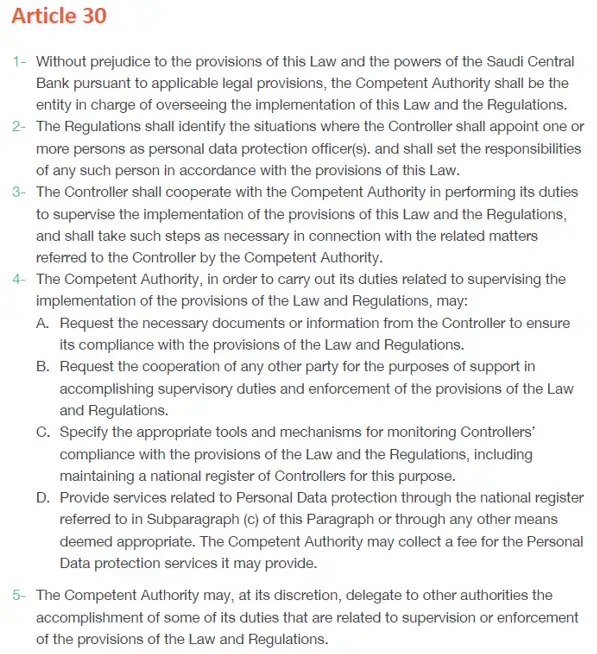
Abstract Of KSA PDPL – Article 30
This paper digs into KSA PDPL Article 30, highlighting the mechanisms for oversight and compliance established under Saudi data protection law. The article underscores the role of the Competent Authority in ensuring regulatory adherence and outlines the requirements for Controllers to support supervisory efforts. Key topics include responsibilities of appointed data protection officers, cooperation mandates, and the national registry of Controllers.
Introduction Of KSA PDPL – Article 30
The Kingdom of Saudi Arabia’s Personal Data Protection Law (KSA PDPL) represents a significant framework for data privacy. Article 30 specifies roles and responsibilities for Controllers and Competent Authorities, establishing a foundation for structured compliance and enforcement. This study examines Article 30 in detail, offering insights into its impact on the data governance ecosystem.
Keywords
KSA PDPL; Article 30; Data Protection Officer; Compliance; Competent Authority; Data Governance; Saudi Data Law
Explanation Of KSA PDPL – Article 30
Article 30 mandates the Saudi Competent Authority to oversee the implementation of the PDPL. It specifies when a data protection officer is required and outlines Controllers’ obligations to support supervisory activities. The Authority may collect fees for data protection services and delegate responsibilities to other bodies.
Key Strategic Points
The primary strategic goal of Article 30 is to ensure Controllers adhere to data protection standards through structured supervision. This aligns organizational data practices with national goals for privacy and protection.
General Activation Steps
Key steps include identifying required roles, establishing monitoring systems, and ensuring alignment with regulatory updates.
Enablement Methodology
Enablement involves training Controllers, defining compliance tools, and motivating collaborative frameworks.
Use Cases Of KSA PDPL – Article 30
Relevant use cases include financial organizations implementing PDPL-compliant data practices and cross-functional compliance audits.
Dependencies
Dependencies include regulatory updates, industry-specific requirements, and technology infrastructure.
Tools/Technologies
Tools such as compliance management platforms and audit software are critical for maintaining oversight.
Challenges & Risks KSA PDPL – Article 30
Potential challenges include evolving regulations, technology limitations, and the need for cross-departmental cooperation.
Conclusion
Article 30 is central to the PDPL’s framework for robust data protection. By enforcing structured oversight, it supports a compliance-focused culture across sectors, contributing to enhanced privacy and security in the Kingdom.
Recommended Resources
- Big Data vs. Traditional Data, Data Warehousing, AI, and Beyond
- Big Data Security, Privacy, and Protection, & Addressing the Challenges of Big Data
- Designing Big Data Infrastructure and Modeling
- Leveraging Big Data through NoSQL Databases
- Data Strategy vs. Data Platform Strategy
- ABAC – Attribute-Based Access Control
- Consequences of Personal Data Breaches
- KSA PDPL (Personal Data Protection Law) – Initial Framework
- KSA PDPL – Consent Not Mandatory
- KSA PDPL Article 4, 5, 6, 7, 8, 9, 10, 11, & 12
- KSA PDPL Article 13, 14, 15, 16, 17, 18, 19, 20, 21, 22, 23, 24, 25, 26, 27, 28, & 29
- KSA NDMO – Data Catalog and Metadata
- KSA NDMO – Personal Data Protection – Initial Assessment
- KSA NDMO – DG Artifacts Control – Data Management Issue Tracking Register
- KSA NDMO – Personal Data Protection – PDP Plan, & PDP Training, Data Breach Notification
- KSA NDMO – Classification Process, Data Breach Management, & Data Subject Rights
- KSA NDMO – Privacy Notice and Consent Management
- Enterprise Architecture Governance & TOGAF – Components
- Enterprise Architecture & Architecture Framework
- TOGAF – ADM (Architecture Development Method) vs. Enterprise Continuum
- TOGAF – Architecture Content Framework
- TOGAF – ADM Features & Phases
- Data Security Standards
- Data Steward – Stewardship Activities
- Data Modeling – Metrics and Checklist
- How to Measure the Value of Data
- What is Content and Content Management?

